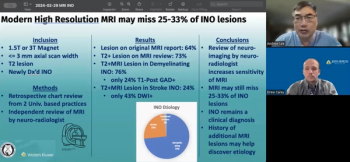
Blog: I’ll be Leonardo and so much more
In a profession that values super subspecialization, combined with a society that pigeonholes physicians into corners, I often felt I didn’t fit into one job title with my varied passions and cross interests.
Editor's note: The views expressed in this blog are those of their respective contributor and do not represent the views of Ophthalmology Times® or MJH Life Sciences®
A world-renowned cataract surgeon recently told me, “Both Jim Carrey and Leonardo DiCaprio are actors, but they don’t try out for the same roles; likewise, you don’t have to do what I do. I’m Jim Carrey, you be Leonardo.”
In a profession that values super subspecialization, combined with a society that pigeonholes physicians into corners, I often felt I didn’t fit into one job title with my varied passions and cross interests.
“It's hard to be what you can’t see.” While this phrase often refers to racial and gender representation, I also believe it expands to career possibilities. If you’ve never been exposed to careers beyond the 9-5 clinic model, it's hard to see how medicine can accommodate physicians with varied talents. You may come to think you are not capable of various roles because they are not in your vocabulary of possibilities.
My parents are Indian immigrants (I can probably stop here for all South Asian descendants), and while there were expectations for strong academics, we were told you were defined by your career, and you only picked one. So, if you had a passion in art, music, or writing, it was a nice hobby that could be indulged by your physician income, but it always stayed on the backburner. And while I grew up with some of these labels, my parents instilled in us a belief that we could accomplish anything with determination and hard work.
As a young child, I witnessed my parents exemplify the value of service to others through their generosity to help those locally and abroad. I helped gather medical supplies for war torn refugees and visited mobile clinics in farm villages in India. I grew up understanding the impact of philanthropy and how it could be used for larger institutional programs.
After residency, I became aware of public health advocacy programs focused on health equity. I learned how to use my professional status to advocate for policies that helped both un- and underinsured members of our local communities. After several years in practice, I was able to understand how my surgical skills could help in relief camps in underserved countries. This has grown into a passion to give back in terms of not only cataract camps, but sustainable skills transfer opportunities and educational programs with local NGOs.
Research and teaching were a natural offshoot of my global health work. As physicians, the “see one, teach one, do one” adage often comes full circle in academic medicine where we are involved with teaching not only residents, but medical students and undergraduates. It’s a natural step for physicians to be on faculty at local medical schools or have some academic appointment.
My research interests further expanded to include biopharmaceutical and medical devices development. Working on the execution of clinical trials has been an incredible opportunity to advance science and reach thousands of lives, as opposed to one patient every 15 minutes. I see the full scope of drugs and devices from conception to safety and finally in my operating room.
I used to hide some of my many interests, feeling it wasn't relevant to patient care, or brushed it off as "just my volunteer work." When those around me were comparing cataract case numbers, I was meticulously logging details about supplied needed for upcoming medical relief camps. While some were overscheduling patients during their lunch hour, I was on advocacy calls to senators trying to lobby for health care access and advocating for food program expansion to alleviate food insecurity. I've settled into my interests, and instead of putting them on a backburner or treating them as a side gig, I've combined them into building my portfolio career.
The Leonardo reference initially referred to a particular actor, but it made me think of Leonardo da Vinci. Despite his fame and accomplishments in art, he epitomized the “Renaissance man” with exploration in anatomy, zoology, geology , optics, and hydrodynamics. In the East, one of the most famous multitalented physicians was Ibn Sina (Avicenna). In addition to medicine, his writings included philosophy, astronomy, geography, geology, psychology, logic, mathematics, physics, and poetry.
These renaissance ideals celebrated persons with many talents or areas of knowledge. Yet somehow modern society has labeled those of us with varied passions and talents as unfocused or undedicated, when in fact the opposite is true. It's because we are so dedicated to our values, we focus our talents in ensuring we use all our skills to make an impact.
I say this all to emphasize that we don't have to be defined by others' expectations. If I want to have a 6 day a week practice, great, go for it. If, on the other hand, I want to spend my time in relief work and nonprofits and only work 3 days, that, too, is a valuable option. Or, if I want to reach thousands of patients and oversee global cutting-edge clinical trials and see patients and operate a couple days a week, fantastic.
I can be a surgeon, an educator, a researcher, a writer, an entrepreneur, and a philanthropist. We can all be Leonardos, and so much more.
Zaiba Malik, MD, is a board-certified ophthalmologist specializing in comprehensive, cataract, and global ophthalmology. In addition, Dr. Malik is a Medical Director at Medpace, providing full service clinical development to biopharmaceutical and medical device companies. She serves as Assistant Clinical Professor in the Surgery Department at Wright State University Boonshoft School of Medicine. She can be contacted at: [email protected]
Newsletter
Don’t miss out—get Ophthalmology Times updates on the latest clinical advancements and expert interviews, straight to your inbox.





























